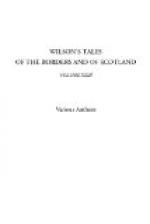“The doctor is so doubtful,” said the anxious mother, with a tear in her eye, “that I have scarcely any hope; and if she is taken away, the very look of Annie, left alone ‘bleating for her sister lamb,’ will break my heart altogether.”
“Yes,” rejoined Mr. Maconie, “it would be hard to bear; but”—and it was the first time since Mary’s illness he had ever remembered the insurance—“it was wise that I insured poor Mary’s life in the Pelican.”
“Insured her life in the Pelican!” echoed the wife in a higher tone. “That was at least lucky; but, oh! I hope we will not need to have our grief solaced by that comfort in affliction for many a day.”
And this colloquy had scarcely been finished when the doctor entered, having gone previously into the invalid’s room, with a very mournful expression upon his face; nor did his words make that expression any more bearable, as he said—
“I am sorry to say I do not like Mary’s appearance so well to-day. I fear it is to be one of those cases where we cannot discover anything like a crisis at all; indeed I have doubts about this old theory being applicable to this kind of fever, where the virus goes on gradually working to the end.”
“The end!” echoed Mrs. Maconie; “then, doctor, I fear you see what that will be.”
“I would not like to say,” added he; “but I fear you must make up your mind for the worst.”
Now, all this was overheard by Annie, who, we may here seize the opportunity of saying, was, in addition to being a sensitive creature, one of those precocious little philosophers thinly spread in the female world, and made what they are often by delicate health, which reduces them to a habit of thinking much before their time. Not that she wanted the vivacity of her age, but that it was tempered by periods of serious musing, when all kinds of what the Scotch call “auld farrant” (far yont) thoughts come to be where they should not be, the consequence being a weird-like kind of wisdom, very like that of the aged; so the effect on a creature so constituted was just equal to the cause. Annie ran out of the room with her face concealed in her hands, and got into a small bedroom darkened by the window-blind, and there, in an obscurity and solitude suited to her mind and feelings, she resigned herself to the grief of the young heart. It was now clear to her that her dear Mary was to be taken from her; had not the doctor said as much? And then she had never seen death, of which she had read and heard and thought so much, that she looked upon it as a thing altogether mysterious and terrible. But had she not overheard her father say that he had insured poor dear Mary’s life with the Pelican? and had she not heard of the pelican—yea, the pelican of the wilderness—as a creature of a most mythical kind, though she knew not aught of its nature, whether bird or beast, or man or woman, or angel? But whatever it might be, certain it was that her father would never have got this wonderful




